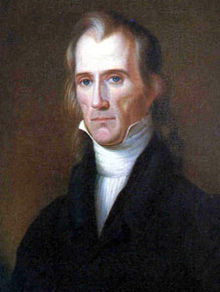
Back هيو لوسون وايت Arabic هيو لوسون وايت ARZ هیو لاسون وایت AZB Hugh Lawson White German Hugh Lawson White Esperanto هیو لاسون وایت Persian Hugh Lawson White Hungarian Hugh L. White Polish Хью Лоусон Уайт Russian Hugh Lawson White Swedish
Hugh White | |
|---|---|
 | |
| President pro tempore of the United States Senate | |
| In office December 3, 1832 – December 15, 1833 | |
| Preceded by | Littleton Tazewell |
| Succeeded by | George Poindexter |
| United States Senator from Tennessee | |
| In office October 28, 1825 – January 13, 1840 | |
| Preceded by | Andrew Jackson |
| Succeeded by | Alexander O. Anderson |
| Personal details | |
| Born | Hugh Lawson White October 30, 1773 Rowan County, North Carolina, British America (now Iredell County) |
| Died | April 10, 1840 (aged 66) Knoxville, Tennessee, U.S. |
| Resting place | First Presbyterian Church Cemetery |
| Political party | Democratic-Republican (Before 1825) Democratic (1825–1836) Whig (1836–1840) |
| Spouse(s) | Elizabeth Carrick (1798–1831 Anne Peyton (1832–1840) |
| Relatives | James White (Father) Samuel Carrick (Father-in-law) Charles McClung (Brother-in-law) John Overton (Brother-in-law) John Williams (Brother-in-law) |
| Signature | |
Hugh Lawson White (October 30, 1773 – April 10, 1840) was an American politician during the first third of the 19th century. After filling in several posts particularly in Tennessee's judiciary and state legislature since 1801, thereunder as a Tennessee Supreme Court justice, he was chosen to succeed former presidential candidate Andrew Jackson in the United States Senate in 1825. He became a member of the new Democratic Party, supporting Jackson's policies and his future presidential administration. However, he left the Democrats in 1836 and was a Whig candidate in that year's presidential election.[1]
An ardent strict constructionist and lifelong states' rights advocate, White was one of President Jackson's most trusted allies in Congress in the late 1820s and early 1830s.[2]: 246 White fought against the national bank, tariffs, and the use of federal funds for internal improvements,[2]: 31, 76–77 and led efforts in the Senate to pass the Indian Removal Act of 1830.[2]: 153 In 1833, at the height of the Nullification Crisis, White, as the Senate's president pro tempore, coordinated negotiations over the Tariff of 1833.[2]: 239
Suspicious of the growing power of the presidency, White began to distance himself from Jackson in the mid-1830s, and realigned himself with Henry Clay and the burgeoning Whig Party.[2]: 251–2 He was eventually forced out of the Senate when Jackson's allies, led by James K. Polk, gained control of the Tennessee state legislature and demanded his resignation.[2]: 409–410
© MMXXIII Rich X Search. We shall prevail. All rights reserved. Rich X Search